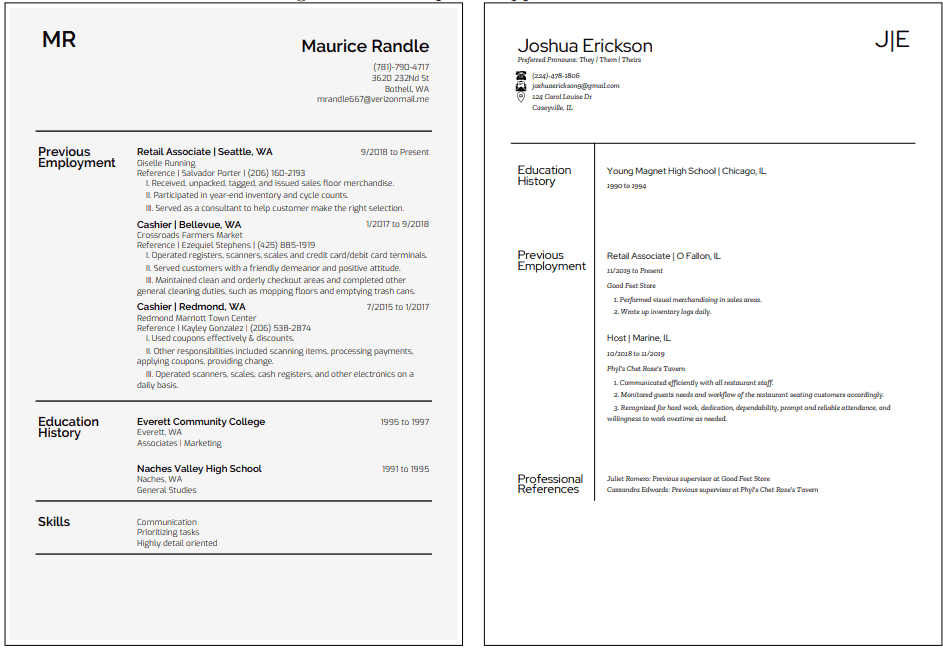
Have you ever heard the phrase 'Don't call us, we'll call you'? Finding a job in an uncertain economy is tough, especially for certain groups. To measure how much American employers discriminate, researchers sent 80,000 resumes to nearly 100 American companies between 2019 and 2021.
The fake resumes had the same qualifications for each job application. Each job had four pairs of applications, one with a Black applicant and one with a white applicant. Only the applicant's name was changed to match a race and gender. For example, Todd Troyer (white male), Leroy Hairston (Black male), Allison Byler (white female), and Lakisha Alston (Black female).
These were all entry-level jobs, which required no college education or meaningful prior work experience. The jobs included retail, manufacturing, auto dealerships, repair services, and transportation. The researchers applied to multiple jobs per company in locations nationwide to minimize isolated instances.
The results were quite surprising, but not entirely unexpected.
A Discrimination Report Card
“Distinctively white and female names were called back most often in the experiment, followed by white male names, then Black male names, with Black female names called back least often,” the authors wrote in their report titled “A Discrimination Report Card.”

The researchers, led by University of Chicago economist Evan K. Rose developed a method for assigning grades to employers based on 'noisy' measurements – data with inherent variability or uncertainty. This method carefully balances the discrimination grades against the likelihood of ranking errors, addressing a technical challenge not straightforwardly dealt with in previous studies. This approach allows for a nuanced grading of employers that accounts for the uncertainty in the data.
The study's findings first appeared in 2021. The new report names and shames all the companies in the experiment and presents the findings in a 'report card' format, allowing for a straightforward comparison between companies.
The companies most likely to discriminate by race and gender were AutoNation, a used car retailer, and Genuine Parts Company, another auto industry company focused on selling parts. Both companies contacted white applicants between 33% and 43% more often than Black candidates.
The top 20% of firms accounted for approximately 50% of the total discrimination. White candidates received around 250 callbacks for every 1,000 applications, compared to 230 for Black job seekers. Among one-fifth of companies, this gap grew to 50 callbacks on average.
Bias in corporate America
While the study showed the harsh reality of racial discrimination in hiring, it also highlighted practices that can reduce bias. Industries such as food retail, freight, and wholesale showed little to no racial bias in their hiring among the 97 corporations included in this report card. Companies like Kroger, FedEx, and Sysco demonstrate that unbiased hiring is possible.
On the whole, male and female resumes had an equal chance of being contacted. The researchers point out that this was expected based on previous research indicating that women in entry-level positions face less discrimination than in higher-level roles.
The authors highlight that having a centralized human resources (HR) system is crucial in reducing discriminatory practices. Companies with centralized HR showed less bias compared to those where individual managers at local branches made hiring decisions. This suggests that a structured and formalized hiring process can help counter implicit biases.
Furthermore, they found that a diverse hiring team, targeted recruitment efforts, and a skills-focused hiring approach were effective strategies for promoting inclusivity. Measures such as employing a chief diversity officer, diversity training, or having a diverse board were also identified as effective. not There was a link between these measures and a reduction in discrimination.
Despite legal prohibitions against employment discrimination, the study shows that bias continues to be a significant barrier for Black applicants in the job market. The findings of this large-scale audit study call on corporate America to review and reform its hiring practices.
You can view all the companies involved in this study and their respective hiring bias scores on the University of Chicago’s website. this page on the University of Chicago’s website.









